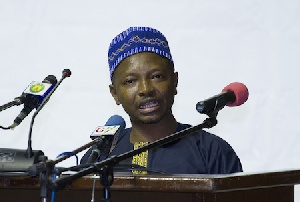Head of the National Youth Organization, Rus Mubarak, in his National Youth Day speech, called for the Government and financial institutions to back a proposed entrepreneurial loan opportunity for young people in Ghana worth a staggering ten-million cedis.
The proposal is an attempt to stem the rising trajectory of youth unemployment in Ghana as the economy continues its downward trajectory with inflation rising to a four-year high of 15.3% - an increase from the recorded 13% of December last year.
In his speech to government ministers, the President and business directors, Rus Mubarak asserted that young people, being the largest constituency in the country, should receive financial support for business enterprise from Ghana’s governmental, financial and educational institutions as a long-term means of consolidating the economy.
He said: “The NYA (National Youth Authority) has identified entrepreneurship as one of the shortcuts to reducing graduate youth unemployment. Our society has to encourage young people to start their own businesses, become their own bosses. As a country, we have no option but to support start-ups. Enterprise will be the key to growing and consolidating Ghana’s economy. Start-ups are the ones who will create the jobs."
To the sum of 10-million cedis, he called for public and private backing to build training centres to develop enterprise in Ghana’s youth whilst imploring Universities to teach undergraduates entrepreneurial skills regardless of their chosen subject (Science, Law, etc.), in a move to empower youngsters with business acumen.
He added: “Your Excellency, the NYA is proposing that government looks into some form of arrangement where if businesses offer say –x amount of apprenticeships, or if banks provide so and so amount of loan facilities to start-ups, they get tax incentives.”
With the economy in a downward spiral, this proposal would be the first time government bodies and Ghana’s banks link-up to provide a genuine opportunity for a young entrepreneur to bring a conceptualized business model to reality. However, getting Ghanaian banks to overlook the palpable risks attached to providing young people with loans and support the programme could be difficult.
Understanding this, Mubarak stipulated that the move to provide a loan opportunity for enterprise could be overshadowed by the lack of faith placed in Ghana’s youth today by financial and governmental institutions with the following anecdote:
“17 Ghanaian Professors who were invited to sit in an airplane for a trip abroad… they were told the plane was made by their own Ghanaian students. Shocked and alarmed, they all jumped and ran out of the plane leaving only one professor; he said ‘if the plane was really made by our own students, trust me it won’t even start."
In spite of this, he credited the GAC, UNFPA, Ghana Broadcasting Corporation, Live FM and Capital TV for the tireless dedication to youth development and for making the current NYA programme possible in the hope that other businesses will join the current crop and increase support for the loan scheme.
Meanwhile, the enormity of the task at hand can be underlined by the lack of data available to the NYA. As a result of poor financial support, data and research into the number of young people in work is almost non-existent. Without proper data, the move to quell the rise in youth unemployment and implement a lucrative loan-scheme could stagnate.
To truly implement the 10-million cedi loan plan, Mubarak and the NYA need the support of businesses, banks and the government to provide opportunities for enterprising youngsters in Ghana. The business acumen to produce an entrepreneurial model is undoubtedly within Ghanaian youngsters, it just needs to be sought out and financially backed by those in a position to do so.
General News of Thursday, 14 August 2014
Source: The Republic

















